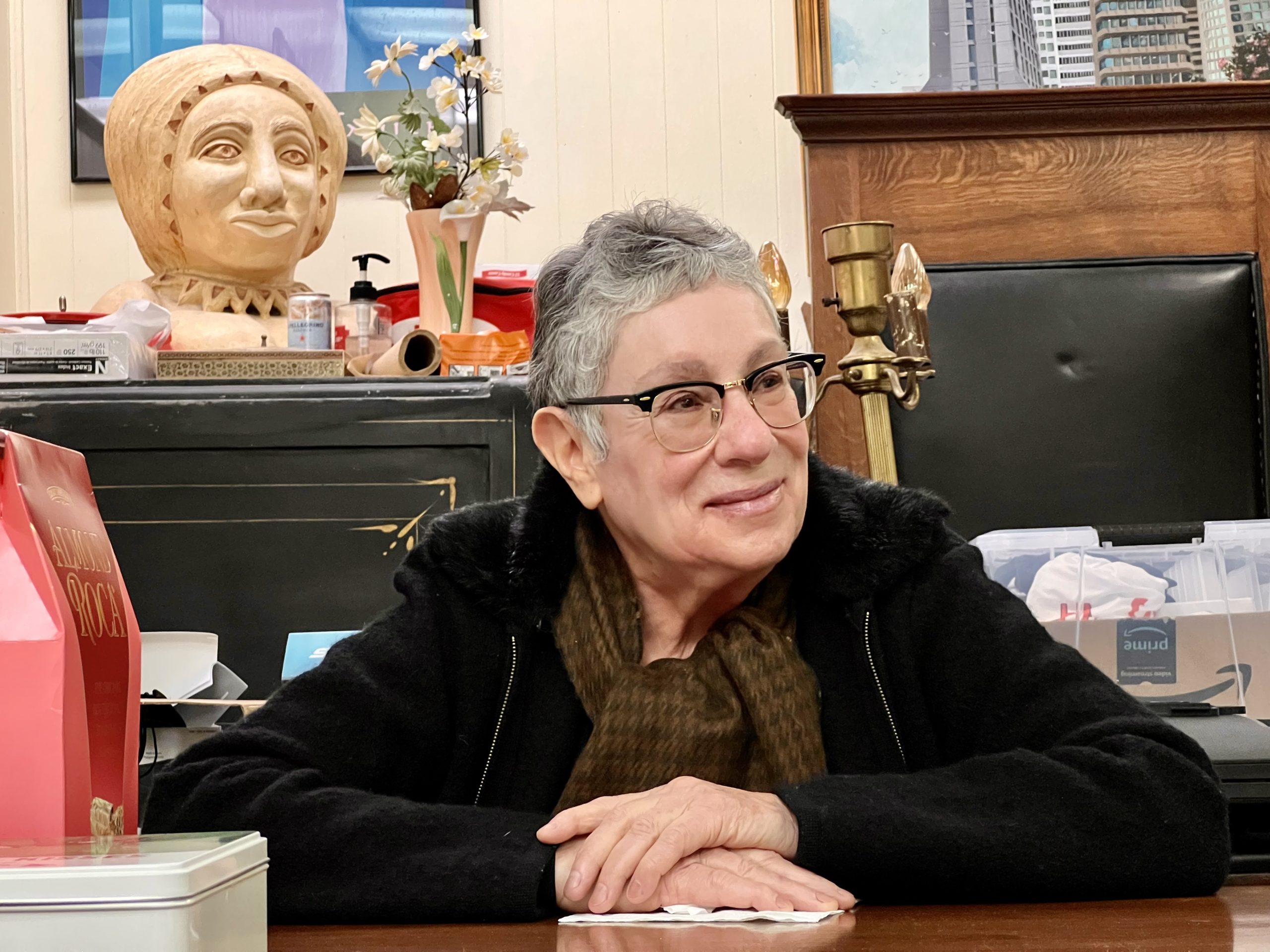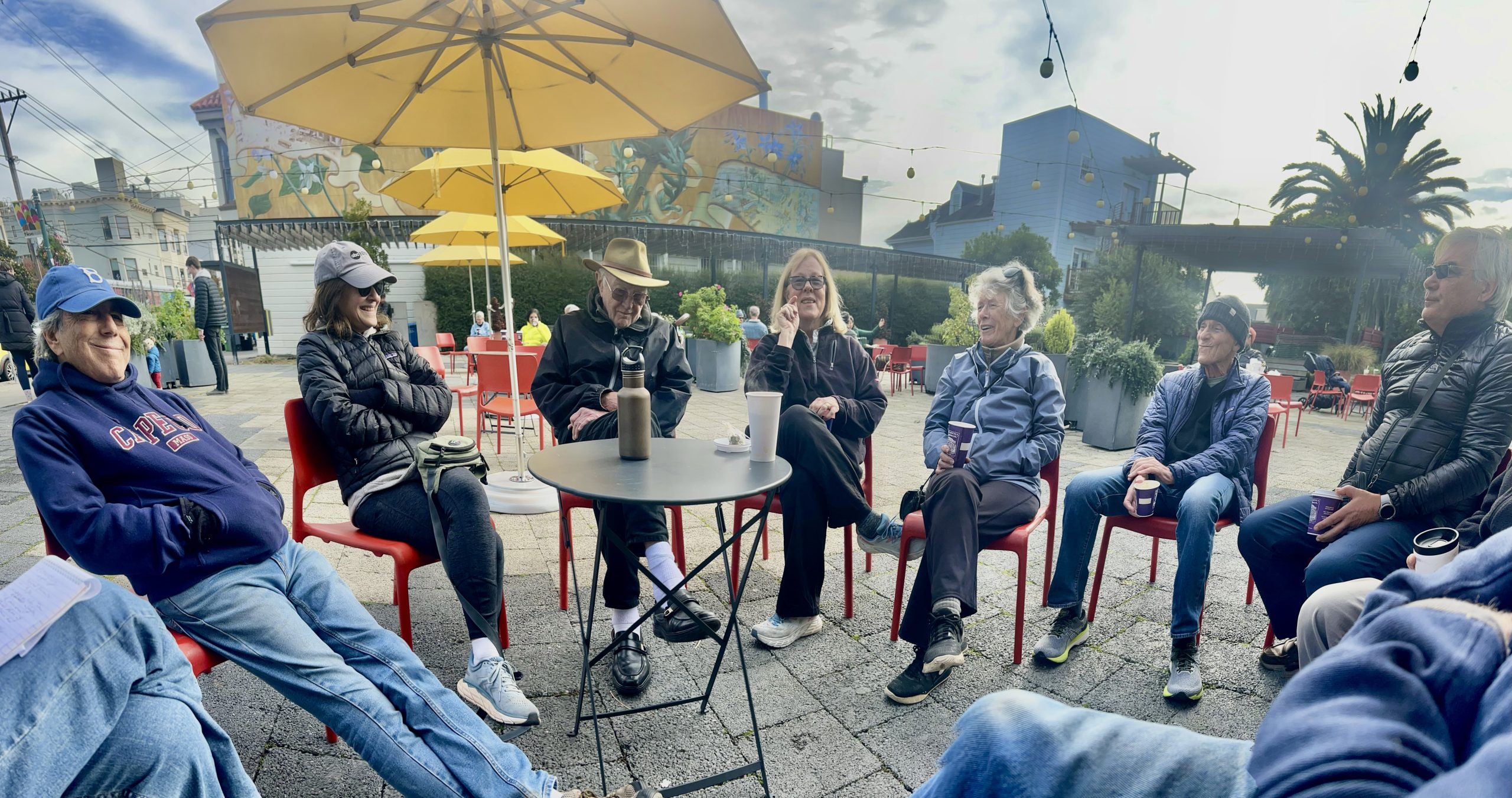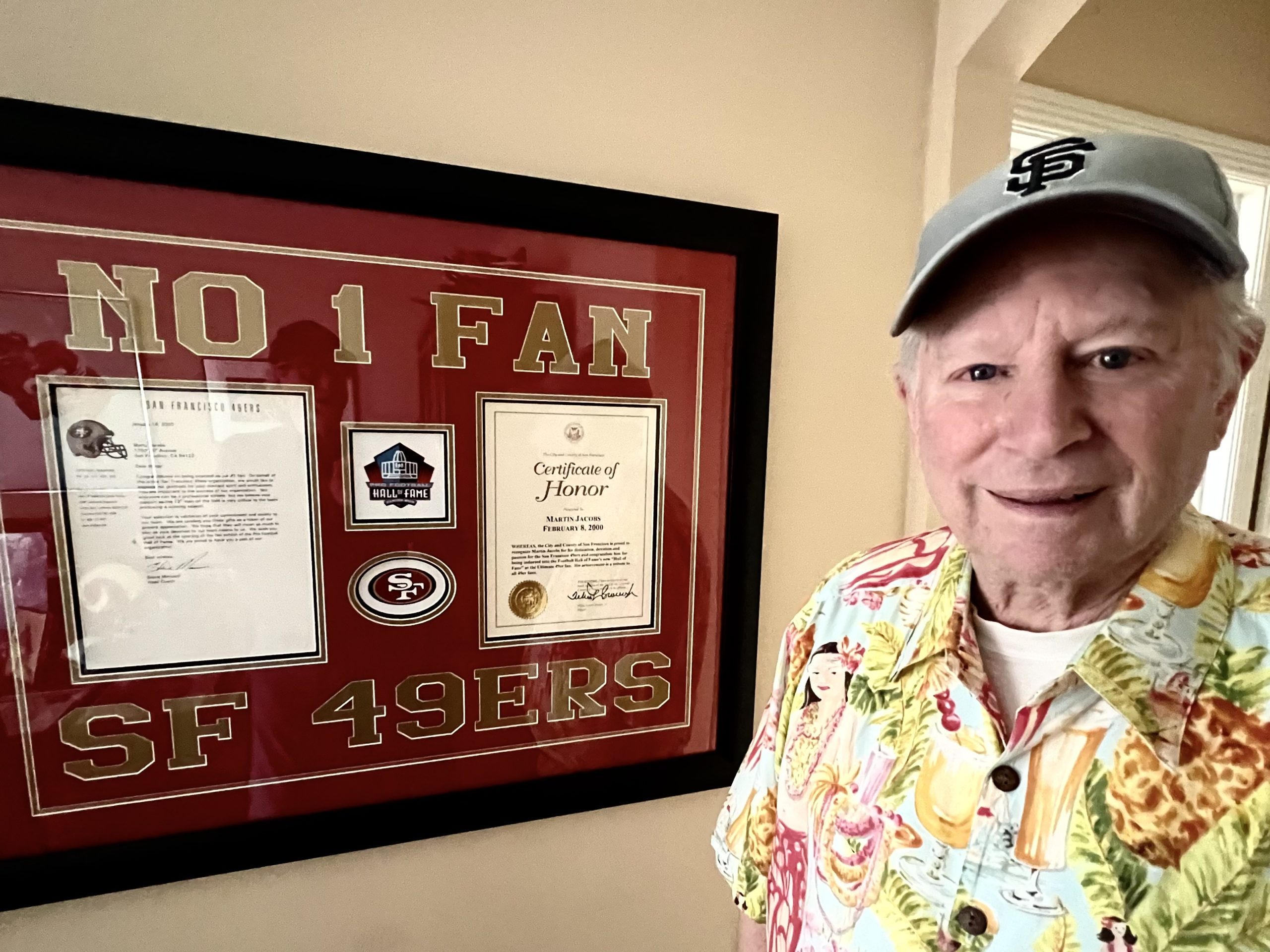Sock hop celebrates first in-person event for LBFE since Covid amid director’s City Hall win to keep the seniors program going
Poodle skirts, Elvis tunes, and peppermint candy all combined to create a modern-day version of a ‘50s sock hop. But it wasn’t an event for teenagers. Dozens of seniors strutted their stuff on the dance floor, played bingo, and snacked on sweets.
The sock hop was the first in-person event Little Brothers – Friends of the Elderly has held for clients since the beginning of the COVID-19 lockdown.
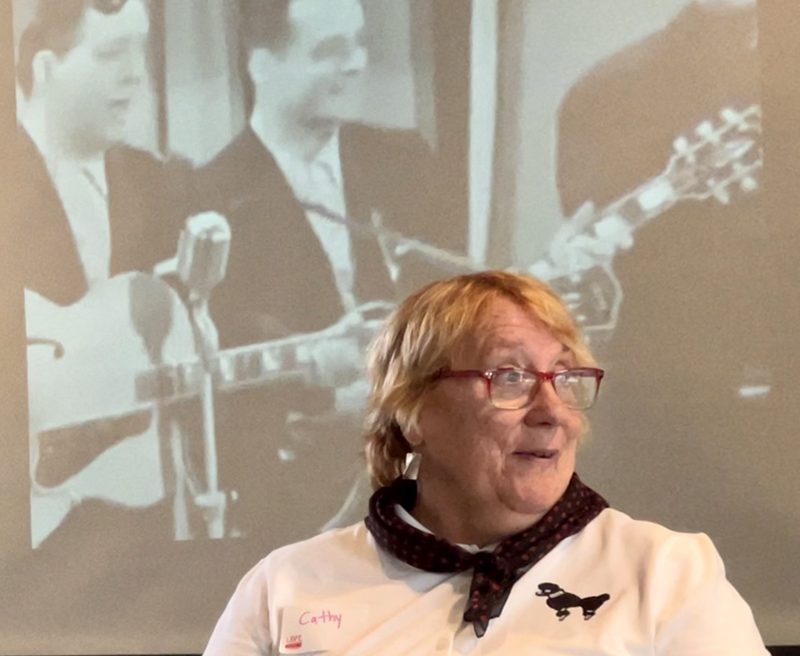
It’s all part of the program’s mission, said Cathy Michalec, LBFE’s executive director since 2015. “What we try to do is connect with people who are socially isolated and lonely by providing support services to them and programs that are led by volunteers.”
About 40 San Francisco seniors gathered on a recent Saturday afternoon at Calvary Presbyterian Church on Fillmore Street, swing skirts aswirl amid dance videos playing on huge screens and candle-lit tables. It was a setting for fun, conversation, and friendliness, all the things the many seniors who live alone are missing.

Festive in a red skirt, a white blouse, a red and black polka-dotted scarf, and brown loafers, Michalec hugged seniors as they arrived and helped pass out bingo cards.
Now 64, Michalec is a veteran of decades of volunteer and socially focused work, including a year spent in a convent where she taught physical education in a Catholic school. Her resume includes a stint as a Peace Corps volunteer in Morocco, fundraising for a public radio station, and director of several nonprofits in Seattle.
Finally, city funding
LBFE’s San Francisco office offers a variety of services to seniors, including twice-weekly phone calls from volunteers, and lessons in how to use an iPad to lessen isolation. LBFE donates the tablets to clients and pays for a broadband account.

“We try to breach the digital divide that many older adults experience,” said Michalec. “They may have retired when there wasn’t a computer on their desk so they are missing things in life like connecting to your doctor for a tele-visit, doing banking online, or connecting with old friends on Facebook or Zoom.”
The sock hop was a celebration of sorts. LBFE, which has three staff members, an office on Hyde Street, and an annual budget of $450,000, recently won a four-year, $75,000 grant from the City of San Francisco. That guarantees the organization will be solvent for the next few years,” said a relieved Michalec.
“We tried about three times to get money from the city and we never did, so it’s a real win for the organization,” she said. “It’s hard because there are so many great causes in San Francisco and you almost start from square zero every October first.”
Growing up in the late ‘60s and early ‘70s, Michalec was influenced by talk of the Vietnam War, racism, and social justice. Disturbed by the assassinations of Martin Luther King Jr. and Robert Kennedy, she began volunteering in high school, where she became president of the Catholic Youth Organization.
A convent and the Peace Corps
She had hoped to become a congressional aide, but the local congressman wouldn’t nominate her “because I was a girl,” she said.
Yet, the rejection spurred her to become the first in her family of five brothers and sisters to go to college, at the University of Wisconsin in Milwaukee, where she grew up.
She took time off from college to volunteer with her aunt’s Catholic order. “I lived in a convent with three other nuns,” she said. “They needed an extra pair of hands. You gave up your social life. Now I’m an atheist, so where does that leave me?”
During her year with the nuns, Michalec worked as a gym teacher and a reading group leader at a Catholic school. The experience convinced her that a life of service and volunteerism was for her.
“I firmly believe in the statement it only takes a few people to change the world,” she said. “That has been my mental model for a long time. I believe in giving service, not because you’re religious, but because you want to make the world a better place.”
After graduating from college in 1985, she headed to Morocco with the Peace Corps. “It was a fantastic opportunity,” she said.
“You learn that people all over are basically the same – all they want is a roof over their heads, food on the table, and people to love.”
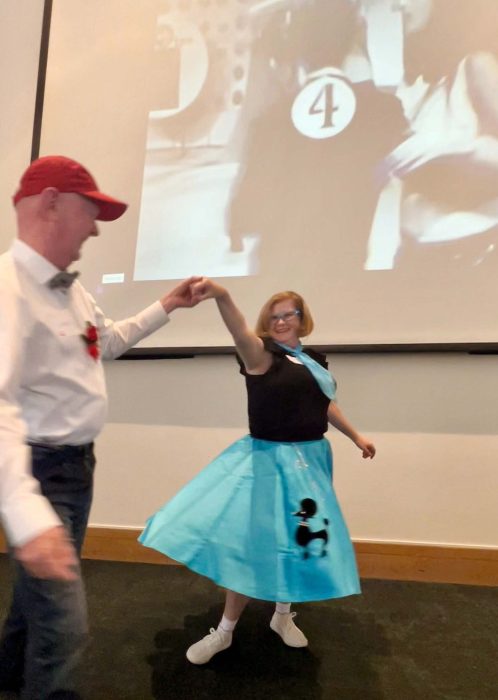
After completing her tour in Morocco, she looked for opportunities to volunteer, working for Goodwill Industries in central Pennsylvania, and a fundraiser for a local public radio and television station.
She met her husband, Jon Engle, and followed him to Seattle, where she became executive director of the Crohn’s & Colitis Foundation. In 2007, she was hired as executive director of Teens in Public Service in Seattle, where she increased the recruitment of teens by 400 percent over seven years.
LBFE was founded in France in 1946 by a group of Catholic lay brothers to assist the parents of soldiers who had been killed in World War II. It became a secular organization when it spread to the United States in 1959. The San Francisco office opened in 1991.
The core program involves a volunteer visiting an elderly client twice a month for six months. “They may be going shopping together or to a play together or just go for a walk. They don’t have to stick to a script,” Michalec said.
Volunteers in the Stroll Buddies program take an older adult out once a week for a 15- or 20-minute walk. Many of her clients are afraid to walk on their own, she said. “Because of uneven sidewalks, getting down the stairs, fear of being attacked, they don’t do it.” Asian clients are particularly concerned about being assaulted on a walk.
LBFE gets referrals from hospital social workers discharging patients who have no one at home. People can refer friends and neighbors by using the referral form on the website.
‘The city everyone thinks is young’
It’s difficult for seniors to ask for help, she said, calling those who do courageous. “You have to be very brave to raise your hand and say ‘I’m isolated and lonely and I need help.’ I think baby boomers ask for help a little bit more easily than the (previous) generation did.”
To be eligible for the program, clients must be 65 or older, or 60 with a disability that prevents them from leaving home. They must have a residence, whether an apartment or assisted living facility and get fewer than two social visits a month.
Fannie Clarke, 89, a Tenderloin resident of 40 years, has been a client for at least 15 years, she said. She likes the way volunteers treat clients: They “listen and ask questions; it’s just their job, And they listen to the answers.” Remembering one of the first volunteers assigned to her, now a Palo Alto doctor with two children,” she said, “I like that she chose to stay in touch with me.”
Clarke has seen the organization evolve from a few volunteers to the program it is today. “In the beginning, they didn’t have the volunteers come to the home,” she said.
Today, LBFE has plenty of volunteers, enough to handle their 400 clients, Michalec said.

Kimmy Demkovich, 32, who was at the sock hop, has volunteered with LBFE for four years. She teaches tech skills and makes grocery deliveries. She said she enjoys hearing of her clients’ experiences.
“Intergenerational friendships are very important,” she said. “I am impressed by people who have lived through decades of change here and have the most unique stories to tell.”
Michalec said more and more people are aware of the health risks of loneliness. The stress of loneliness, she said, “increases all the diseases that we don’t want, like heart attack and stroke.”
Programs like LBFE will increasingly be needed.
“The elderly is the fastest growing population in San Francisco,” said Michalec. “So more people are aging in a city that everyone thinks is so young.”



